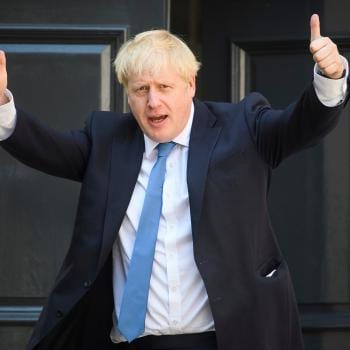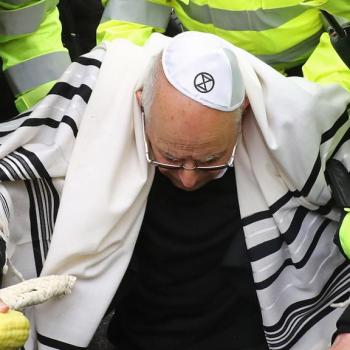Dear Prince William
To be honest I’d rather you didn’t go to Israel this summer. Much better to stay home with Kate and help look after the new baby. Why not take some paternity leave and set a good example for Britain’s fathers?
But I realise you don’t really have a choice in the matter. You’re going, and that’s that.
Your employer is Her Majesty’s Government and your job is to ‘bat for Britain’ in whatever way is considered most useful to our national interests. So if you have to go, make it count. Make it count by understanding the real purpose of your visit. Make it count by asking the right questions when you get there. And make it count by meeting the right people.
If you come back understanding what makes some of us, including many Jews, so angry about Israel perhaps the whole thing will have been worthwhile after all.
A shift in protocol
The first thing I’d ask of you is to recognise that your trip marks a big shift in UK diplomatic protocol.
You are the first senior member of the Royal Family to make an official visit to Israel in its 70-year history. And it’s not been for a lack of invitations.
Up until now it’s always been understood that politics has been the stumbling block. As recently as 2015 a Whitehall source explained the position to the Daily Telegraph.
“Until there is a settlement between Israel and the Palestinian Authority, the Royal family can’t really go there.”
So what’s changed?
There’s been no breakthrough in relations between the Palestinian Authority and Israel. In fact, the reverse is true. The relationship is at an all-time low following Donald Trump’s decision to recognise Jerusalem as the indivisible capital of the Jewish State of Israel. Something the UK has so far chosen not to endorse. For the Palestinians, whether in the West Bank, East Jerusalem or Gaza, things just get worse. So your visit is hardly a reward for progress on the peace making front.
BREXIT
There’s only one way to understand this trip. And that’s BREXIT.
Last week in an interview with Ynet the British Ambassador to Israel, David Quarrey, said your stay “…wouldn’t be a political visit. It would be a visit about the strength of the contemporary partnership and relationship between the UK and Israel.”
That means it’s about business. And when was a conversation between nations about business not political?
I suspect the origins of your visit go back to April last year when Benjamin Netanyahu met Theresa May for talks in Downing Street. At the end of the visit the two leaders announced they were “preparing the ground” for a trade deal by setting up a “joint working group”.
The following month when Foreign Secretary Boris Johnson made his own visit to Israel he told reporters in Jerusalem, as he stood alongside Prime Minister Netanyahu:
“We are building a global identity as a Britain that’s coming out of the EU and we want to build on our trading partnership with you. We are the biggest European trading partner with Israel … We have the largest, fastest-growing Aston Martin dealership anywhere in the world here in Israel.”
Our trading relationship with Israel is currently worth about £4.9bn but it’s clear that after our EU exit and free of Brussel’s trade shackles we’re looking to beef things up considerably.
In the last few years there’s already been the biggest deal in UK-Israel history with Rolls-Royce winning a £1bn contract to service and maintain its Trent 1000 engines for the Israeli airline El Al.
Meanwhile, the Israeli defence firm Elbit Systems is in a consortium that provides the Ministry of Defence with training aircraft and simulators.
As Ambassador Quarrey told the Guardian in May 2017:
“We’re seeing trading bilateral relationships between the UK and Israel, in science and trade for example, doing better than ever. But there’s the potential to do even better, particularly in the context of Brexit.”
It looks like technology, defence and pharmaceuticals (one in seven NHS drugs come from Israel) will be the focus of a future post EU trade deal that could set the template for the new age of ‘Global Britain’.
The cost of doing business
So never mind peace, and never mind justice, and for sure never mind whatever happens to the Palestinian people. With Brexit happening we need to start building trade in new places. Israel fits the criteria well. And never mind if all this cutting edge technology and defense capability has been achieved as commercial spin-offs from 50 years of a military occupation which the UK government remains opposed to, at least in theory.
So be under no illusions about why you are being sent to Israel. This is the new world of post-Brexit diplomacy and you are about to become its public face.
Soon, if it’s not happened already, Israel will be like China and Saudi Arabia, too big a trading partner for the UK to fall out with. Too much will be invested (quite literally) in the relationship for any political leverage in the name of human rights to be applied with any success. Every strengthening of business ties will weaken the cause of justice and human rights. Leaving the EU will lower the bar on UK standards in more ways than one.
Take your own causes with you
So what thoughts should you take to Israel and who should you ask to see when you get there?
If I was you I’d want to keep in mind the causes I’ve already chosen to champion, where you already have an interest and knowledge.
The Royal Foundation, which you set up with your brother Harry and Kate, has chosen four areas of work for its focus.
- Armed forces
- Conservation
- Mental Health
- Young people
Why not let these areas shape your itinerary in Israel or at least the questions you may care to ask your hosts?
Armed forces – Like your brother you served in the British Armed Forces so you have an insight into the reality of military life. Why not ask to meet with the veteran combatants of Breaking the Silence? They work to stimulate public debate about the price paid by young soldiers who must control a civilian population on a daily basis. They aim to end the occupation.
Conservation – If you want to understand how conservation can become a tool of ethnic cleansing then visit Britannia Park. It’s a forest planted by the Jewish National Fund starting in the 1950s, and with the financial aid of British Jews. The forest covers up the remains of three Palestinian villages Ajjur (4,330 residents), Dayr al-Dubban (850 residents) and Kudna (520 residents). The Palestinians who fled were never allowed to return. Kibbutz Beit Nir was established on the land belonging to the village of Kudna.
A visit here would help you understand why the Palestinian people see the creation of Israel as an act of forced displacement and colonisation. Ask for a guide from Zochrot (‘remembering’ in Hebrew) a Jewish Israeli NGO which promotes acknowledgement and accountability for the ongoing injustices of the Nakba (‘Catastrophe’ in Arabic).
Mental health – You have a particular interest in mental health and have done much to promote understanding in the UK. Why not ask the British charity Medical Aid for Palestinians to meet you at their offices in Gaza to explain the mental health issues facing Palestinian children there?
Among children living in bombarded areas of Gaza, the rate of severe Post Traumatic Stress Disorder has been recorded as 54%. Immediately after the 2014 Israeli assault on Gaza, the World Health Organisation estimated that up to 20% of the population of Gaza may have developed mental health conditions, corresponding to 360,000 people requiring mental health or psychosocial interventions.
Young people – If you want to meet young people go to Bethlehem see the work of the Holy Land Trust’s ‘Young Girls Empowerment programme’. It’s a project designed to educate, develop and inspire young women into leaders rather than become disengaged, marginalized and oppressed people. This project helps young Palestinian teenage girls to see themselves as creators of their own fate, rather than as victims of their circumstances.
So as you can see there’s lots you can choose to do that fits well with your own priorities and will give you a deeper appreciation of what’s taken place in Israel over the last 70 years.
Prince William, if you have to go to Israel don’t just be a post-Brexit salesman for UK Plc. Make it count by getting informed and bring that learning back home.
Yours sincerely
Robert Cohen
















